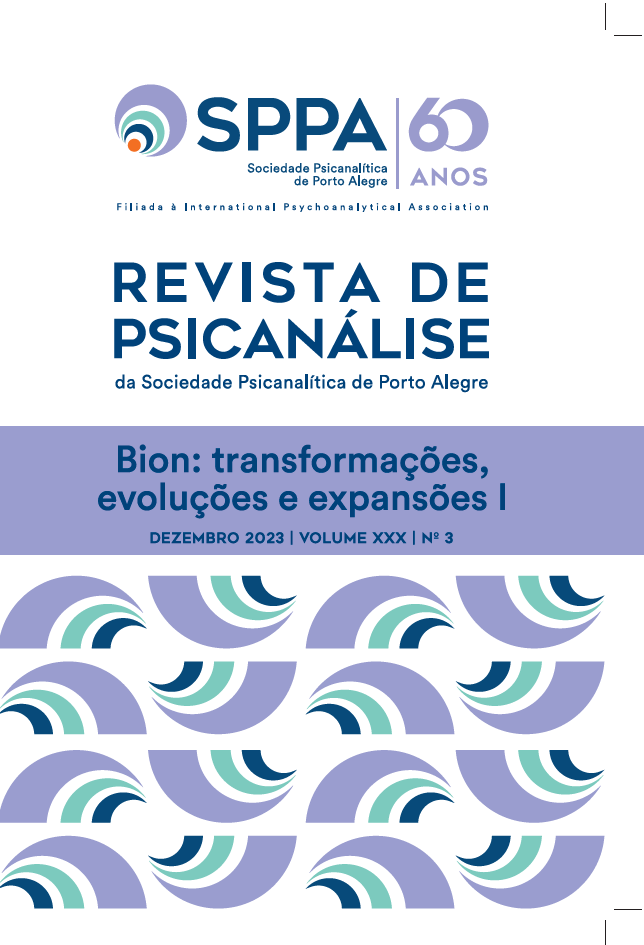Os nomes de O
Bion é um místico?
Palavras-chave:
Bion, Intersubjetividade, Invariância, Misticismo, O, TransformaçõesResumo
O conceito de O é um dos mais problemáticos de Bion e, portanto, fonte de interpretações fantasiosas. Contudo, não pode ser deixado de lado, pois assume um significado teórico e clínico essencial na sua obra. O fato é que O não deve ser considerado isoladamente, mas sempre como componente de uma tríade de conceitos, junto aos de invariante e de transformação. O papel que desempenha, de acordo com o caso, nasce do jogo dialético que faz com eles, mas não só isso. A peculiaridade de O é que Bion lhe atribuiu muitos nomes. Deve-se, assim, considerar um segundo plano dialético inerente ao O em si, no qual todos esses nomes se relacionam entre si. Entre eles, alguns suscitam desconfiança por sugerirem que Bion tenha se voltado para a mística (Deus, divindade, o Uno, Pessoa-em-si). Por isso, é importante lembrar que Bion declara abertamente que, dos termos emprestados por outras disciplinas, o que lhe interessa é fazer uso da penumbra de associações que os envolvem, mas sempre e somente para os próprios fins.
Downloads
Referências
Bion, W.R. (1973). Trasformazioni. Il passaggio dall'apprendimento alla crescita. Roma: Armando. (Trabalho original publicado em 1965).
Bion, W.R. (1973). Attenzione e interpretazione. Roma: Armando. (Trabalho original publicado em 1970).
Bion, W.R. (1993). Memoria del futuro. Il sogno. Milano: Raffaello Cortina. (Trabalho original publicado em 1975).
Bion, W.R. (1991). Memoria del futuro. (3 vol). Milano: Raffaello Cortina.
Bion, W.R. (1992). Cogitations. Roma: Armando.
Bion, W.R. (1998). Addomesticare i pensieri selvatici. Milano: Franco Angeli. (Trabalho original publicado em 1997).
Bléandonu, G. (1994). Wilfred Bion: His Life and Works, 1897-1979. London, Free Ass. Books. (Trabalho original publicado em 1990).
Braver, L. (2014). Groundless Ground: A Study of Wittgenstein and Heidegger. Cambridge: MIT.
Civitarese, G. (2016). Vortici, ritmi, idee: Esperienza estetica e costituzione intersoggettiva dell'individuo. Riv. Psicoanal., 62, 977-984.
Civitarese, G. (2017a). Trasposizioni. Glossarietto di psicoanalisi. Udine-Milano: Mimesis.
Civitarese, G. (2017b). Bion and Contemporary Psychoanalysis. In _____. Reading ‘A Memoir of the Future'. London: Routledge.
Civitarese, G. (2018b). Rester en attente. À propos du concept bionien de capacité négative. Rev. Franç. Psychanal., 82, 39-50.
Civitarese, G. (2019). The concept of time in Bion's ‘A theory of thinking'. Int. J. Psychoanal., 100, 182-295.
Freud, S. (1895). Progetto di una psicologia scientifica. In _____. O.S.F. (Vol. 2).
Freud, S. (1887-1904). Lettere a Wilhelm Fliess 1887-1904. Torino: Boringhieri, 1986.
Grotstein, J.S. (a cura di) (1991). Do I Dare Disurbe the Universe? A Memorial to W.R. Bion. London: Routledge.
Grotstein, J.S. (2004). The seventh servant. Int. J. Psychoanal., 85, 1081-110.
Hegel, G.W.F. (2008). La fenomenologia dello spirito. Torino: Einaudi.
Hegel, G.W.F. (2009). Enciclopedia delle scienze filosofiche. Bari: Laterza.
Kirchmayr, R. (2008). Merleau-Ponty. Una sintesi. Milano: Marinotti.
Kristeva, J. (2006). La rivoluzione del linguaggio poetico. Lavanguardia nell'ultimo scorcio del XIX secolo: Lautréamont e Mallarmé. Milano: Spirali. (Trabalho original publicado em 1974).
Ogden, T.H. (2012). Il leggere creativo. Saggi su fondamentali lavori analitici. Milano: CIS.
Sandler, P.C. (2006). The origins of Bion's work. Int. J. Psychoanal., 87, 179-201.
Souter, K.M. (2009). The war memoirs: Some origins of the thought of W. R. Bion. Int. J. Psychoanal., 90, 795-808.
Tomasello, M. (2014). Unicamente umano. Storia naturale del pensiero. Bologna: Il Mulino.
Zolesi, E. (2004). Commento. In: Dante Alighieri, La Divina Commedia. Roma: Armando.
Downloads
Publicado
Como Citar
Edição
Seção
Licença

Este trabalho está licenciado sob uma licença Creative Commons Attribution-NonCommercial-NoDerivatives 4.0 International License.
Atribuo os direitos autorais que pertencem a mim, sobre o presente trabalho, à SPPA, que poderá utilizá-lo e publicá-lo pelos meios que julgar apropriados, inclusive na Internet ou em qualquer outro processamento de computador.
I attribute the copyrights that belong to me, on this work, to SPPA, which may use and publish it by the means it deems appropriate, including on the Internet or in any other computer processing.
Atribuyo los derechos de autor que me pertenecen, sobre este trabajo, a SPPA, que podrá utilizarlo y publicarlo por los medios que considere oportunos, incluso en Internet o en cualquier otro tratamiento informático.










